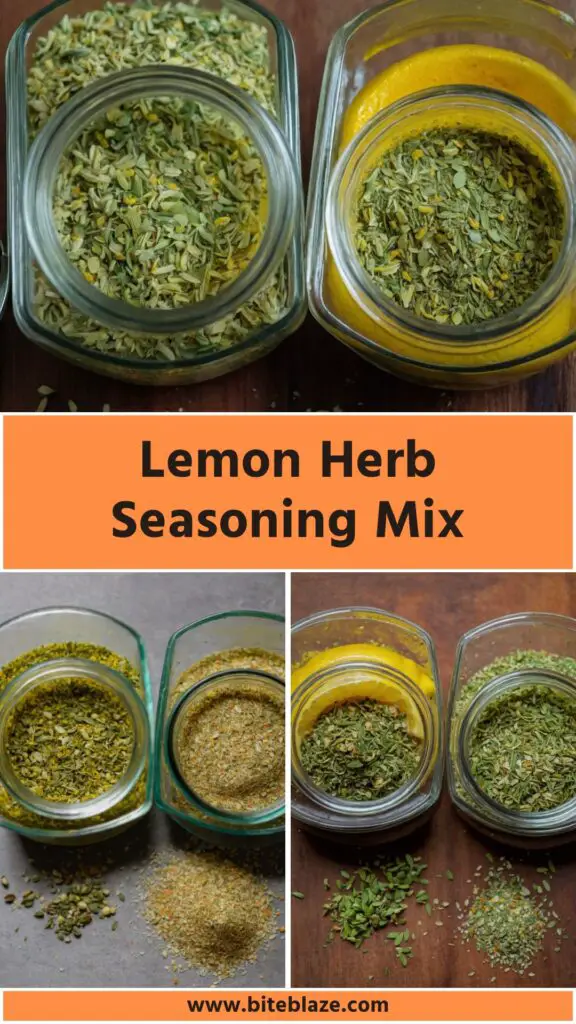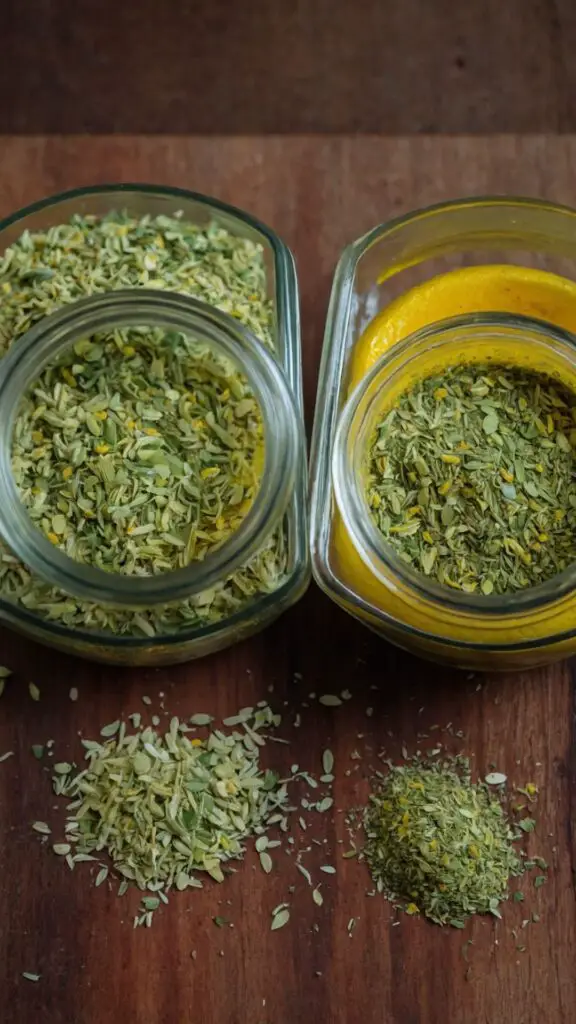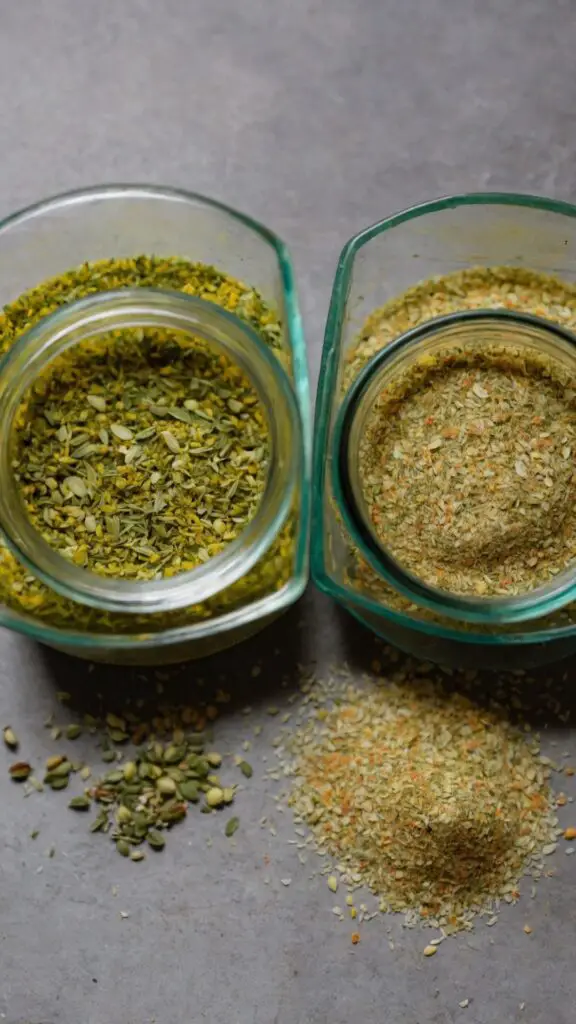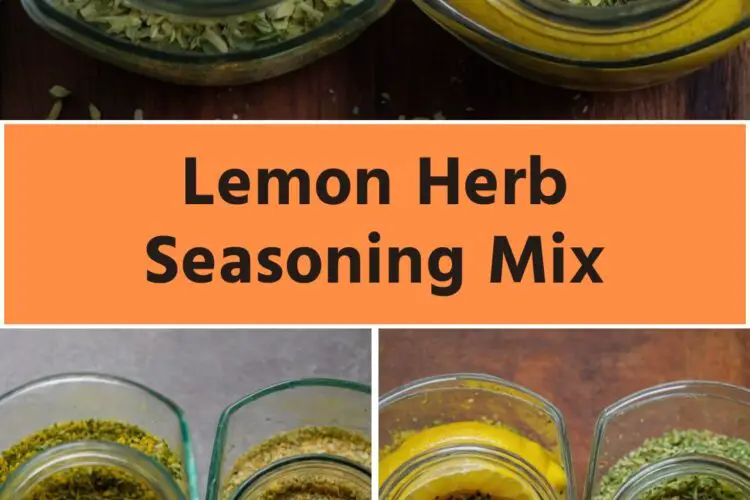When you think of Lemon Herb Seasoning Mix, imagine brightening up grilled chicken, enhancing the flavor of roasted vegetables, or mixing with olive oil for a zesty salad dressing.
You can sprinkle it on fish for an extra kick or mix it into hummus for a tasty dip. This versatile blend can transform pasta, rice, or even potatoes, making it a perfect addition to your culinary stash.

Picture this: a warm summer evening, friends gathered around a grill, laughter filling the air, and the tantalizing scent of herbs wafting through the yard.
You slide a platter of grilled chicken sprinkled with lemon herb seasoning onto the table. Everyone dives in, and suddenly, your recipe becomes the talk of the night. That’s the magic of a good seasoning mix.
Lemon Herb Seasoning Mix not only enhances dishes but transports you right to that idyllic summer sunset, no matter the season. It’s simple, affordable, and fresh. My goal today is to dive deep into how to create your own Lemon Herb Seasoning Mix. This recipe is a game-changer, and you won’t want to miss it.
What is Lemon Herb Seasoning Mix?
Lemon Herb Seasoning Mix is a delightful blend of dried herbs and spices that typically includes basil, parsley, oregano, and garlic powder, all accentuated with the vibrant zest of lemons.
It’s a seasoning that brings brightness to any dish. Think about it: lemon zest adds a zesty punch, while herbs provide earthy flavors, creating a harmony that elevates your meals.
But this mix is more than just a combination of flavors. It’s a convenient way to enhance your cooking. Instead of reaching for multiple spice jars, a single spoonful of this mix can transform the mundane into the magnificent.
What Makes This Recipe Different from Other Lemon Herb Seasoning Mixes?
The beauty of my Lemon Herb Seasoning Mix lies in its simplicity and freshness. While many recipes might opt for store-bought options filled with preservatives and artificial flavors, this mix allows you to retain control over the quality of ingredients. My version features high-quality dried herbs and zesty lemon rind without any unnecessary additives.
Moreover, the proportions here are intentionally crafted based on years of exploring flavor combinations. By balancing the brightness of lemon with the earthiness of herbs, this mix stands out as uniquely aromatic and invigorating.
You will also like the following Seasoning recipes!
How Does It Taste?
The first time I used this Lemon Herb Seasoning Mix, I was pleasantly surprised. Imagine the refreshing feeling of biting into a lemon-infused dish, with the warm undertones of basil and parsley complementing it. The flavor is bright, uplifting, and utterly satisfying.
When you sprinkle this seasoning on grilled chicken, the citrus dances with the savory elements of the meat. On vegetables, it transforms ordinary sides into star attractions. It’s versatile enough to harmonize with a vast array of ingredients, making it an indispensable addition to your spice cabinet.
Ingredients You’ll Need to Make This Dish
Creating your Lemon Herb Seasoning requires only a few simple ingredients, which you might already have in your pantry. Here’s what you need:
1 Tbsp Whole Celery Seed: Adds a subtle sweetness and crunch.
4 Tbsp Dried Basil: Provides a familiar, earthy flavor.
½ Tbsp Thyme: Brings a subtle, aromatic quality.
2 Tbsp Grated Lemon Rind (dried): The star of the mix! It infuses a bright zest.
3 Tbsp Dried Parsley: Offers freshness and color.
1 Tbsp Finely Ground Black Pepper: Adds a touch of heat.
½ tsp Garlic Powder: Delivers depth and warmth.
3 Tbsp Dried Oregano: Complements the other flavors beautifully.
1 Tbsp Dried Onion Flakes: Adds another layer of taste.

Step by Step Instructions
Step 1: Gather Your Ingredients
Head to your kitchen and collect all the ingredients. Having everything out on the counter makes the process smooth and enjoyable.
Step 2: Measure the Dried Herbs
Using measuring spoons, carefully measure each of the dried herbs into separate bowls. This helps you avoid any mix-ups.
Step 3: Combine the Ingredients
Take a mixing bowl and start adding the herbs one by one. Be sure to include the grated lemon rind; this is what will set your seasoning apart!
Step 4: Mix Thoroughly
Using a whisk or a spoon, combine all the ingredients thoroughly. You want to ensure that no single herb dominates the mix.
Step 5: Store the Mix
Find an airtight container—glass jars work wonderfully for this. Transfer your Lemon Herb Seasoning Mix into the container, sealing it tight.
Step 6: Label and Date
Don’t forget to label the jar with the name and date. It helps you keep track of freshness, making it easy to pull it out whenever you’re ready to cook!
Tips & Tricks for Making Lemon Herb Seasoning Mix
Star Quality Ingredients: Always use high-quality dried herbs. You’ll notice the difference in flavor.
Use Whole Spices: If possible, coarsely grind herbs like basil or oregano just before mixing. Freshly ground spices pack a stronger punch.
Experiment: Feel free to tweak the ratios based on your taste. Perhaps you prefer more garlic? Go ahead and add more!
Avoid Moisture: Ensure your mixing tools and storage container are completely dry. This prevents the mix from clumping.
Try Fresh Ingredients: If you can find fresh herbs, consider using them! Just dry them out completely before mixing, as moisture can spoil your blend.
Nutrition Information
While exact nutrition can vary, here’s a rough estimate of the nutritional value for a tablespoon of Lemon Herb Seasoning Mix:
Calories: 15
Total Fat: 0.5g
Sodium: 2mg
Total Carbohydrate: 2g
Dietary Fiber: 1g
Protein: 1g
It’s low-calorie and adds significant flavor without piling on the pounds!
How Do I Store This Dish?
To keep your Lemon Herb Seasoning Mix fresh, store it in a cool, dark place away from heat sources and direct sunlight. A pantry or a cupboard is ideal. When stored correctly, you can expect it to retain its peak flavor for several months. Just make sure to seal it tightly after each use.

What Other Substitutes Can You Use in Lemon Herb Seasoning Mix?
If you find yourself running low on ingredients or simply want to shake things up, here are some substitutes:
Dried Dill: This herb can impart a slightly different flavor but still brings freshness. Use it in place of parsley for a unique twist.
Lemon Zest Powder: If lemon rind isn’t available, opt for lemon zest powder, which can offer a sweet, citrusy flavor.
Herbs de Provence: This blend features thyme and can be used interchangeably for a slightly floral note.
Chives: If you love a mild onion flavor, consider substituting onion flakes with chives for a fresh touch.
Lemon Juice Powder: For a punchier citrus zing, lemon juice powder can replace lemon rind, though you’ll need slightly less due to its concentrated flavor.

Lemon Herb Seasoning Mix
Ingredients
Equipment
Method
- Head to your kitchen and collect all the ingredients. Having everything out on the counter makes the process smooth and enjoyable.
- Using measuring spoons, carefully measure each of the dried herbs into separate bowls. This helps you avoid any mix-ups.
- Take a mixing bowl and start adding the herbs one by one. Be sure to include the grated lemon rind; this is what will set your seasoning apart!
- Using a whisk or a spoon, combine all the ingredients thoroughly. You want to ensure that no single herb dominates the mix.
- Find an airtight container—glass jars work wonderfully for this. Transfer your Lemon Herb Seasoning Mix into the container, sealing it tight.
- Don’t forget to label the jar with the name and date. It helps you keep track of freshness, making it easy to pull it out whenever you’re ready to cook!
Nutrition
Notes
- Star Quality Ingredients: Always use high-quality dried herbs. You’ll notice the difference in flavor.
- Use Whole Spices: If possible, coarsely grind herbs like basil or oregano just before mixing. Freshly ground spices pack a stronger punch.
- Experiment: Feel free to tweak the ratios based on your taste. Perhaps you prefer more garlic? Go ahead and add more!
- Avoid Moisture: Ensure your mixing tools and storage container are completely dry. This prevents the mix from clumping.
- Try Fresh Ingredients: If you can find fresh herbs, consider using them! Just dry them out completely before mixing, as moisture can spoil your blend.
Tried this recipe?
Let us know how it was!Frequently Asked Questions
1. Can I use fresh herbs instead of dried ones?
Yes, you can! If using fresh herbs, make sure to dry them thoroughly before mixing. Use about three times the amount of fresh herbs as the dried counterpart, since dried herbs are more concentrated.
2. How long does the seasoning mix last?
When stored in a cool, dark place in an airtight container, it can last from six months to a year. However, for the best flavor, aim to use it within three months.
3. Can I sell my homemade seasoning mix?
You can do this! Just be sure to research your local regulations regarding food sales, packaging, and labeling to ensure compliance.
4. Can the mix be used on seafood?
Absolutely! This tangy, herbal seasoning works wonderfully with fish, shrimp, and even shellfish. Just sprinkle it on before cooking for an added burst of flavor.
5. Is this mix vegan-friendly?
Yes, it is entirely vegan! The ingredients contain no animal products, making it suitable for any plant-based diet.
Conclusion
Creating your own Lemon Herb Seasoning Mix is a fun, rewarding endeavor. With a handful of common ingredients, you can conjure a burst of flavor that enhances everything from grilled meats to salads. Not only is it simple to make, but it also opens up a world of possibilities in your cooking.
When you make this seasoning mix, you’re not just following a recipe. You’re crafting something personal—a blend that reflects your tastes and enhances your meals. So, as you fire up that grill or toss a salad for a summer gathering, remember: a sprinkle of this mix might just earn a few compliments.
Now, let’s get cooking! Your Lemon Herb Seasoning Mix awaits its moment to shine. Happy Cooking!


